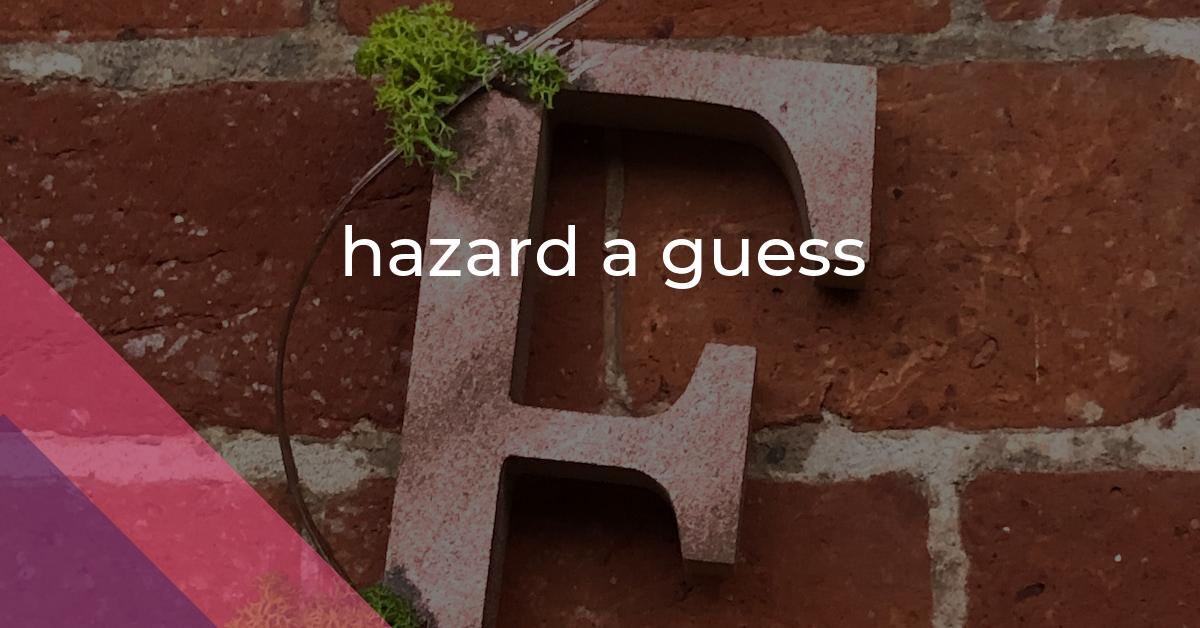hazard a guess: Idiom Meaning and Origin
What does ‘hazard a guess’ mean?
The idiom "hazard a guess" means to make a guess or estimation without having all the necessary information. It implies taking a risk or chance in offering an opinion or answer.

Idiom Explorer
The idiom "take a shot in the dark" means to make a guess or attempt something without any knowledge or information. It implies a lack of certainty or confidence in the outcome.
The idiom "have a stab" means to attempt or try to do something, often with uncertainty or without much experience or skill.
The idiom "have an accident" refers to unintentionally causing or experiencing a mishap, usually resulting in injury or damage.
The idiom "hang in the balance" means to be in a state of uncertainty or indecision, where the outcome is yet to be determined.
The meaning of the idiom *gun jumping* is to act prematurely or make assumptions without having all the necessary information. It is often used in legal and business contexts when someone takes actions or makes decisions without properly considering the consequences.
The idiom "guess what" is used to introduce or emphasize surprising or unexpected information or news.
The idiom "go out on a limb" means to take a risk or to put oneself in a vulnerable position by expressing an opinion or taking an action that is not widely supported or accepted.
Deciphering the Enigma
Hazard a guess is an idiom commonly used in English language to describe the act of making a guess or an estimate without having complete or accurate information. The phrase is often used in situations where one is unsure or lacks sufficient knowledge to provide a definite answer or solution. It can be related to other idioms such as "take a shot in the dark", "lay odds", and "anyone's guess".
The word "hazard" in the idiom suggests taking a risk or chance, while "guess" signifies an estimate or conjecture. When combined, the phrase implies venturing a guess or taking a speculative stance in the absence of concrete facts or evidence. It conveys a sense of probability rather than certainty, highlighting the uncertain nature of the guess being made.
The origin of the idiom "hazard a guess" is not definitively known. However, it can be traced back to the Middle English period, where the word "hazard" was used to mean to take a chance or risk. The term "guess" has a long history dating back to Old English, with roots in Germanic languages. Over time, the phrase "hazard a guess" emerged, combining these two words to create the idiom that is still used today.
The use of this idiom is not limited to any specific context or domain. It can be employed in various situations, both formal and informal, to indicate an estimate or assumption being made. It is particularly useful when discussing uncertain or ambiguous situations, allowing individuals to express their thoughts or opinions without committing to a definitive answer.
When someone says "I'll hazard a guess," they are essentially signaling their intention to make an estimation or inference, even though they are not completely certain about the correctness of their guess. It is a way to contribute to a conversation or problem-solving process without claiming certainty. The idiom emphasizes the tentative nature of the guess, acknowledging that it may be subject to error or revision if more information becomes available.
"Take a shot in the dark" is another idiom related to "hazard a guess". It means to make a guess or attempt something without having sufficient information or knowledge. Both phrases highlight the element of uncertainty involved in making an estimate or conjecture. While "hazard a guess" suggests a willingness to take a risk in making a guess, "take a shot in the dark" adds the notion of doing so without much expectation of success.
"Lay odds" is also related to "hazard a guess". It refers to the act of offering or accepting a wager on the outcome of an event. While "hazard a guess" focuses on making an estimate or conjecture, "lay odds" involves putting forth a prediction or assessment that can be substantiated with tangible stakes. Both idioms involve some element of speculation or prediction.
"Anyone's guess" is another idiom that is akin to "hazard a guess". It suggests that the outcome or answer to a question is uncertain or unknown. Both phrases convey a sense of ambiguity and lack of definitive knowledge. While "hazard a guess" implies an individual making an estimate or conjecture, "anyone's guess" emphasizes the collective uncertainty or variability in the possible outcomes or answers.
Hazard a guess captures the essence of uncertainty and the human tendency to make estimates or assumptions even when faced with limited information. It reflects our desire to engage in discussions and share opinions while acknowledging the inherent uncertainty of our knowledge. The idiom serves as a reminder that sometimes, taking a chance and venturing an educated guess can lead to new insights or discoveries. Although it does not offer a perfect solution, it invites dialogue and encourages further exploration in the pursuit of knowledge.
Example usage
Examples of how the idiom "hazard a guess" can be used in a sentence:
- Can you hazard a guess at what time the event will start?
- I'm not sure of the answer, but I'll hazard a guess and say it will take about two hours.
- He didn't know the exact number, so he decided to hazard a guess and estimate around 50 people.
More "Guessing" idioms



